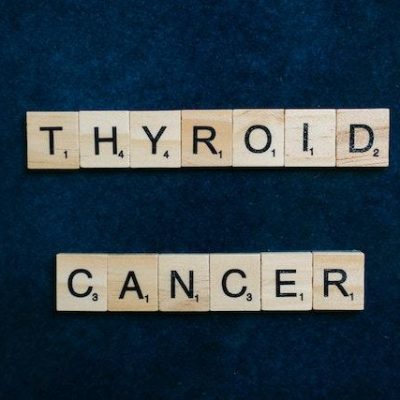These are all linked to the thyroid because it directs important processes that happen throughout the body. I will discuss the best foods for hypothyroidism below.
Thyroid hormones help control your metabolism. When the levels are too low, metabolism slows down. Symptoms can include feeling chilly, fatigued, getting constipated, feeling down, and gaining weight. Low levels of thyroid hormone is called hypothyroidism.
There are some important foods and nutrients that can help you feel better. By providing your body with proper nutrition—along with prescribed medications—you can help reduce your symptoms.
Before we dive into my nutrition tips for you, let’s start by understanding the thyroid and why it’s so important for your body and mind.
What does your thyroid do?
Your thyroid is a butterfly-shaped gland at the front of your neck that secretes thyroid hormones. These hormones control your metabolism (the way your body uses energy). These affect several processes throughout the body, including your breathing, heart rate, body temperature, and brain. When thyroid hormones are high, many systems speed up. When hormone levels are low, they slow down.
Thyroid hormones are very important during pregnancy and breastfeeding. Not only for the health of the mother but also the developing baby. Thyroid hormones help with proper development of babies’ bones, brains, and nervous systems.
Low thyroid (hypothyroidism and Hashimoto’s)
Low levels of thyroid hormone (hypothyroidism) is common. Nearly 1 in 20 Americans aged 12 or older experience underactive thyroid. Overactive thyroids, or hyperthyroidism, is much less common affecting just 1 in 100 Americans. Thyroid problems occur most often in women, people over 60 years old, and those with a family history of thyroid issues.
The most common cause of hypothyroidism is Hashimoto’s disease. This is an autoimmune condition. It happens when the body’s immune system—designed to fight off germs and infections—mistakenly attacks and destroys the body’s own cells. People with other autoimmune disorders (celiac disease, type 1 diabetes, lupus, etc.) are more likely to develop Hashimoto’s disease than those who do not have an autoimmune disease.
Other less common causes of hypothyroidism are inflammation, iodine deficiency, other diseases, medications, or it can be present at birth.
Symptoms of Weight gain in hypothyroidism
These symptoms can vary from person to person and may have causes other than low thyroid. Hypothyroidism develops gradually over time, so it’s possible not to notice symptoms for months or even years.
Testing and treatment of best foods for hypothyroidism
Some symptoms of weight gain – weight change or fatigue—can be subtle. Blood tests can confirm whether thyroid hormone levels are too low. If you’re experiencing symptoms, it’s important to ask your healthcare provider to see if you should be tested. Left untreated, hypothyroidism increases the risks of high cholesterol, high blood pressure, and heart disease.
The standard treatment for an underactive thyroid is a medication that replaces the hormones your thyroid can no longer make. Once you and your doctor find the right dose, many symptoms may improve dramatically.
Autoimmune conditions (Hashimoto’s and celiac disease)
Some autoimmune diseases can exist for years without many obvious symptoms. Then, once the body becomes over-stressed, e.g., after a pregnancy or illness, the symptoms may appear. These can include Hashimoto’s and celiac disease.
If you have been diagnosed with celiac disease, be sure to stick to your gluten-free diet. Some people have reported needing lower amounts of thyroid hormone medications after a period on a gluten-free diet. One reason is that with the gluten-free diet the intestines are healing, and they may be better able to absorb the medication. Another reason may be that the gluten-free diet reduces the levels of inflammation in the body, including inflammation of the thyroid gland, so they need less medication.
Thyroid and weight
The thyroid helps to control metabolism, so it can directly impact your weight. With hypothyroidism, the body isn’t metabolizing (using energy) as well as it could be. This means that more of the foods and drinks we consume aren’t metabolized (“used” or “burned”). This can lead to some weight gain.
Weight gain is just one of many symptoms of Hypothyroidism. Many things can cause weight gain, and therefore, it may not result from hypothyroidism. In fact, if weight gain is the only symptom of hypothyroidism, it’s less likely to be from hypothyroidism. Other factors that can affect your metabolism (and weight) are other hormones, food intake, and your own body weight.
In general, weight gain associated with hypothyroidism is about 5-10 pounds. This means that when hypothyroidism is diagnosed and treated, weight loss is small. Typically, successful treatment of hypothyroidism results in a return to the body weight before the hypothyroidism developed.
Iodine, the essential mineral for thyroid hormones
Thyroid hormones contain the mineral iodine. This means that the thyroid needs iodine to make its hormones. Iodine deficiency is uncommon in the United States but occurs in other areas of the world.
The recommendation for adults is 150 mcg of iodine per day. Pregnant and breastfeeding women need 220 – 290 mcg per day. The American Thyroid Association recommends that women who are planning pregnancy, pregnant, or breastfeeding take a multivitamin containing 150 mcg iodine per day (the rest of the daily iodine can come from food and drinks).
Iodine is found in seawater and some soils. Food sources of iodine are iodized salt, fish, shellfish, dairy, eggs, and soy products. Seaweed (kelp, dulse) is one food that may have high amounts of iodine.
It’s possible—especially with autoimmune thyroid disorders—to be sensitive to side effects from too much iodine. Some supplements and medications (like some cough syrups) contain high levels of iodine. Too much iodine may worsen hypothyroid symptoms and can increase the risk of developing an overactive thyroid. Be sure to check your product labels or ask your healthcare provider.
Soy and cruciferous vegetables (cabbage, broccoli, cauliflower) contain compounds known as “goitrogens.” These can interfere with the thyroid’s ability to take in dietary iodine. Consuming large amounts of these is not a concern for people who have sufficient levels of iodine.
Nutrition tips for taking thyroid medications
There are special dietary considerations if you’re taking thyroid medications.
Be sure to follow the instructions for taking your medications. This may mean taking it with water on an empty stomach to avoid potential interactions. After you take it, you might need to wait several hours before taking any supplements or other medications that contain iron, calcium, or magnesium. It’s also a good idea to steer clear of high-fiber foods, soy, and walnuts for those few hours, as they may reduce how much your body absorbs.
If you take thyroid medication, avoid consuming grapefruit or its juice, as these may interact. This effect may last more than several hours, so if you love grapefruit, talk to your doctor or pharmacist to see if your medication needs to be adjusted.
Best foods for Hypothyroidism
Eating a healthy diet for your thyroid can help you feel better. The following foods and nutrients do this by supporting your metabolism, digestive system, heart, and brain.
A thyroid-healthy diet includes:
- Fruits, vegetables, nuts, and seeds (these contain essential vitamins and minerals and are also sources of dietary fiber for digestive health)
- Lean protein such as eggs, poultry, lean meats, legumes (with their fiber), and fish and shellfish (with their omega-3s for heart and brain health)
- Whole grains (avoid gluten-containing grains if you have celiac disease)
- Heart-healthy oils like olive oil (with its unsaturated fats)
Cut down on processed foods—especially those that contain hydrogenated oils and excess sodium and sugar. Minimize soft drinks, potato chips, candy, etc. that are high in calories and low in nutrients.
Bottom Line
For thyroid health, nutrition is important. Knowing what to eat when your metabolism is slow can help you feel better and reduce your symptoms. It’s also important to know what foods and drinks to avoid in the few hours before and after taking your medications.
If you feel that you have symptoms that may be related to thyroid issues, speak with a healthcare provider. They will review your history, symptoms and help you decide if you need testing or treatment. Never stop taking your medications without speaking with your doctor or pharmacist first
Need nutrition support for your thyroid? Book an appointment with me to see if my program/service can help you. https://cherylbuckley.com/contact-us-2/
References
American Thyroid Association. (n.d.). Iodine deficiency. Retrieved from https://www.thyroid.org/iodine-deficiency/
American Thyroid Association. (n.d.). Thyroid and weight. Retrieved from https://www.thyroid.org/thyroid-and-weight/
Gluten Intolerance Group. (n.d.). Celiac disease & thyroid conditions. Retrieved from https://gluten.org/2019/10/17/celiac-disease–thyroid-conditions/
Harvard Health. (2019, June 5). When depression starts in the neck. Retrieved from https://www.health.harvard.edu/diseases-and-conditions/when-depression-starts-in-the-neck
Harvard Health. (n.d.). Healthy eating for a healthy thyroid. Retrieved from https://www.health.harvard.edu/staying-healthy/healthy-eating-for-a-healty-thyroid
Harvard Health. (n.d.). Is it just midlife, or is your thyroid slowing down? Retrieved from https://www.health.harvard.edu/womens-health/is-it-just-midlife-or-is-your-thyroid-slowing-down
Institute for Quality and Efficiency in Healthcare. (2017, August 10). Underactive thyroid: overview. Retrieved from https://www.ncbi.nlm.nih.gov/books/NBK279601/
Mayo Clinic. (2019, September 4). Hypothyroidism diet: Can certain foods increase thyroid function? Retrieved from https://www.mayoclinic.org/diseases-conditions/hypothyroidism/expert-answers/hypothyroidism-diet/faq-20058554
Mayo Clinic. (2020, February 1). Levothyroxine (oral route). Retrieved from https://www.mayoclinic.org/drugs-supplements/levothyroxine-oral-route/proper-use/drg-20072133
Medscape. Levothyroxine (Rx). Retrieved from https://reference.medscape.com/drug/synthroid-levoxyl-levothyroxine-342732#11
National Institute of Diabetes and Digestive and Kidney Diseases. (2017, September). Hashimoto’s Disease. Retrieved from https://www.niddk.nih.gov/health-information/endocrine-diseases/hashimotos-disease
National Institute of Diabetes and Digestive and Kidney Diseases. (2016, August). Hypothyroidism (underactive thyroid). Retrieved from https://www.niddk.nih.gov/health-information/endocrine-diseases/hypothyroidism
NIH Office of Dietary Supplements. (2019, July 9). Iodine fact sheet for health professionals. Retrieved from https://ods.od.nih.gov/factsheets/Iodine-HealthProfessional/
NIH News in Health (2015, September). Thinking about your thyroid. Retrieved from https://newsinhealth.nih.gov/2015/09/thinking-about-your-thyroid
Synthroid. (n.d.). Taking Synthroid the right way. Retrieved from https://www.synthroid.com/starting/taking-synthroid-the-right-way

